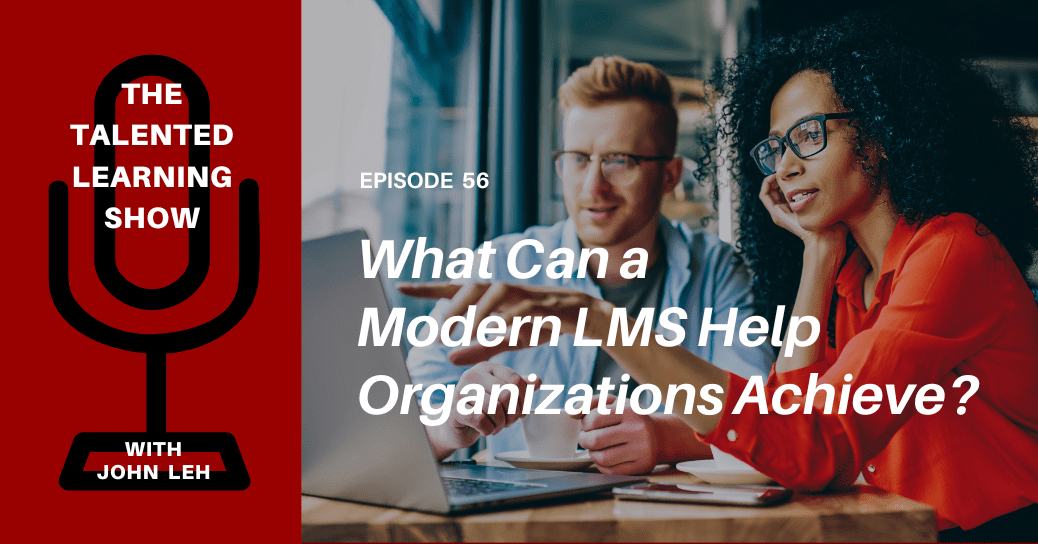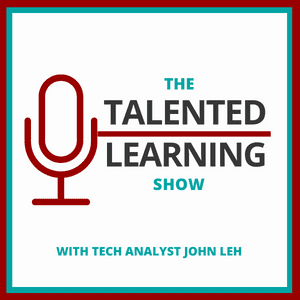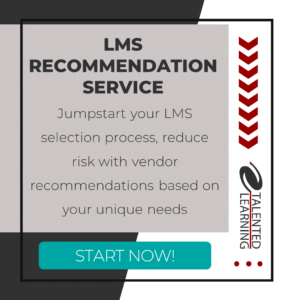
Podcast: Play in new window | Download
Subscribe: Apple Podcasts | Spotify | Amazon Music | Android | iHeartRadio | Blubrry | Email | RSS
EPISODE 56: INSIDE THE MODERN LMS

John Baker, President, CEO and Founder, D2L
It’s not every day I get the chance to interview a learning industry rockstar, but today is one of those days. That’s because I’m talking with John Baker, President and CEO of D2L – a leading LMS company he founded almost 24 years ago.
John is an innovator with a bold vision for the modern LMS. He’s a true expert with insight into what’s ahead for learning experience design, skills and competencies, personalization, learning cohorts, measurement, and much more.
That’s why I’ve wanted to interview him for a long time. So join us as we look at how the modern LMS is changing to support lifelong learning — from grade school to college, and throughout our professional careers.
INSIDE THE MODERN LMS – KEY TAKEAWAYS
- A pioneer in the academic LMS space, D2L entered the corporate market several years ago. Now, D2L is leveraging its strengths to gain traction in key enterprise segments.
- A modern LMS doesn’t just help employers build workforce skills. It also can improve talent mobility and retention by using AI to link people and skills with relevant projects, positions, and development paths.
- Many learning systems don’t include professional services. But this is one way D2L differentiates its solutions, by offering skilled instructional designers, web developers, data analysts, and other specialists who add value.
INSIDE THE MODERN LMS – Q&A HIGHLIGHTS
Welcome, John. Why don’t you start by introducing yourself and D2L?
I started D2L when I was in my third year at university. I wanted to solve a problem that would have a big impact on the world, and I couldn’t think of anything bigger than transforming the way the world learns.
Learning has this wonderful ripple effect — from one person to the next, from one generation to the next, to our communities, to our companies. It really is the foundation upon which we make progress.
So, I set out to build a learning platform that could deliver higher quality learning experiences that are more engaging, more inspiring, and help people achieve more than they imagine. Fast forward to today, and we’re still building, growing, and working on new problems.
Do you want more information and analysis on the top 40 learning systems in the world? Buy our 2023 Corporate Learning Systems Market Update report – now available through the 2nd half of this year at a 50% discount!
And how are you growing your business?
Our platform focuses on learning experiences that engage people. And we’re doing this for over 15.5 million learners around the world, with clients in over 40 countries in education and in the corporate market.
When we started, everything happened in the classroom. So in our first wave, we digitized everything. All assignments, all activities, all learning content, all assessments.
Then, we spent a lot of time trying to optimize for better outcomes. For example, how can we drive better employee retention? How can we improve student engagement for each market we serve? Ultimately, how can we drive better results for our clients?
Now that we’re digital, we have a bit of runway to build on the great data and insights available to us. So I’m excited about the next wave, where we’re optimizing and actually transforming the learning experience, itself.
How so?
We’re making it easier to engage and inspire people. We’re also putting tools in the hands of content creators so they can more easily develop video and interactives without having to know code. Ultimately, this makes it easier for people to learn.
D2L first focused on K-22. Then, interestingly, you expanded into the corporate market. That’s not easy. What drove this shift?
We were actually pulled into the corporate market by big clients that were using all kinds of technologies and they weren’t happy. They wanted to offer their workforce a better learning experience; a modern LMS.
After three years of working with corporate clients around the world, it’s clear many organizations are still managing learning with spreadsheets. They’re using backend administrative systems, not really user-friendly systems. And their learning models are largely based on SCORM and other antiquated standards.
So we decided to put more energy toward this market.
I see…
We decided not to try to boil the ocean and go after all of corporate all at once. Rather, we zeroed- in on organizations where we can have the biggest impact. In our case, that’s folks who do employee training at scale.
We’ve got expertise in that from the education market. It’s a sweet spot for us.
For example, think about big consulting firms that might onboard 80,000 people a year. After rolling out our technology, one of these firms saved $4 million for every 1000 employees they onboarded. That’s because there’s a better learning experience. They got to productivity faster and there was less churn, so fewer people left the organization.
Makes sense…
You know, a modern learning experience can make a big difference in companies. Upskilling and learning are critical as people go from one stage in their careers to the next.
I used to think all you needed to do to make a big impact on the world was just to launch people into a career. But we can have an even bigger impact by helping them navigate from one step in their career to the next.
And the economy needs us to do this. With all the change that is sweeping through every industry, learning is even more important.
In your view, how is an “old” learning experience different from a “new” approach?
The old way of thinking is like the page-turners everyone has experienced. It’s one size fits all. Everyone has to do everything the exact same way. It doesn’t matter if you know the material or not, you’ve got to go through it all. It’s like an industrial-era model for learning. But we’ve evolved.
The new way is personalized competency-based learning. So, instead of forcing you to go through everything, we quickly assess your competencies and skills. Then we help you focus your energy on the skills you need to develop.
This way, you spend less time with learning content and activities, but you’re actually learning more. You’re also retaining that knowledge longer while gaining the skills you really need.
Yep. The concept of skills has been around for a long time, but it seems the industry got away from it. Do you think this is taking hold again?
Do you want more information and analysis on the top 40 learning systems in the world? Buy our 2023 Corporate Learning Systems Market Update report – now available through the 2nd half of this year at a 50% discount!
I think so. And they go by different names. So “skills” might be the lower level, while “competencies” could be the next level. And at a higher level, people may be pursuing programs or certificates.
But the idea of stackable micro-credentials makes a lot of sense for the corporate work environment because people don’t always have a lot of time. So it’s critical if you can zero in on a specific skill you’re trying to sharpen, right in when you need it for a particular project or deliverable.
And it’s helpful if you can capture that skill as part of your learner record. Then you can stack that with a bunch of other work you’ve done, so you have evidence to confirm your expertise in that area.
We can make those pathways. So, for example, instead of having to get a Master’s Degree in Machine Learning, you can get formal recognition much, much faster. It’s great for career growth.
In terms of the learning experience, you said personalization and adaptive learning are key. What does that actually look like for learners?
Great question, John. Most people get this confused. They think personalization is self-paced, where everyone moves through whatever they’re learning in an isolated way.
That’s not the way I think of it. I think of personalization as the connection between you and the learning content — or the connection between you and your instructor — or the connection between you, your peers, and your company. It’s actually a human connection.
We don’t see personalization as a lonely, individualized pathway through learning content. So we’re building-in lots of ways for people to connect socially around learning.
It may be through mentorship or participation in a cohort of some sort. These are all opportunities to build a connection that makes learning more relevant for you.
Interesting. What other game-changing approaches are you pursuing?
So many corporate systems are designed as admin systems to “manage” learning. It’s very rigid. But we approach the problem as an open API around everything.
We have 1800 technologies you can integrate out of the box. We have freely available data so you can pull it into big BI stacks to understand what’s happening on the learning side of your business.
We automate things that would normally take a systems integrator months of effort to set up. So we’re trying to create more of an open ecosystem. This way, you don’t need to think about learning only as what happens in your learning platform.
D2L is not just a software company — you also run a serious services business. That’s important. How does that work?…
…FOR COMPLETE ANSWERS TO THIS AND MORE QUESTIONS ABOUT LMS INNOVATION, LISTEN TO THE FULL 30-MINUTE PODCAST!
Need Help Finding the Best Training Content Business LMS?
Fill out the form below to request a complimentary consultation call with John Leh:




